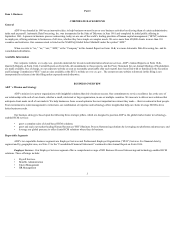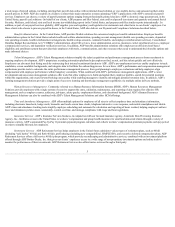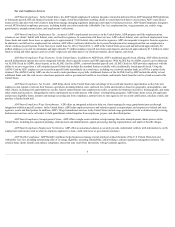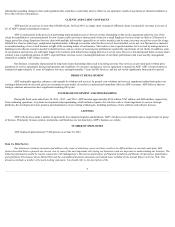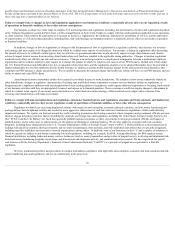ADP 2015 Annual Report Download - page 14
Download and view the complete annual report
Please find page 14 of the 2015 ADP annual report below. You can navigate through the pages in the report by either clicking on the pages listed below, or by using the keyword search tool below to find specific information within the annual report.
markets or otherwise may require us to sell client fund assets to satisfy our short-term funding requirements, which may result in the recognition of losses and
adversely impact our results of operations, financial condition and cash flow.
We are dependent upon various large banks to execute electronic payments and wire transfers as part of our client payroll, tax and other money movement
services. While we have contingency plans in place for bank failures, a systemic shutdown of the banking industry would impede our ability to process funds on
behalf of our payroll, tax and other money movement services clients and could have an adverse impact on our financial results and liquidity.
We derive a significant portion of our revenues and operating income outside of the United States and, as a result, we are exposed to market risk from
changes in foreign currency exchange rates that could impact our results of operations, financial position and cash flows.
Change in our credit ratings could adversely impact our operations and lower our profitability
The major credit rating agencies periodically evaluate our creditworthiness and have given us very strong, investment grade long-term debt ratings and
the highest commercial paper ratings. Failure to maintain high credit ratings on long-term and short-term debt could increase our cost of borrowing, reduce our
ability to obtain intra-day borrowing required by our Employer Services business, and adversely impact our results of operations.
If the distribution of CDK Global® common stock to ADP’s stockholders does not qualify as a tax-free spinoff, we could incur substantial liabilities and
may not be fully indemnified for such liabilities
On September 30, 2014, the Company completed the tax-free spinoff of its former Dealer Services business through the distribution of all of the issued
and outstanding common stock of CDK Global, Inc. (“CDK Global”) to ADP’s stockholders. CDK Global was formed to hold ADP’s former Dealer Services
business and, as a result of the distribution, became an independent public company trading under the symbol “CDK” on the NASDAQ Global Select Market. Prior
to completing the spinoff of CDK Global, ADP received an opinion from Paul, Weiss, Rifkind, Wharton & Garrison LLP, its counsel, to the effect that, based on
certain facts, assumptions, representations and undertakings set forth in the opinion, the distribution qualified as a transaction that is tax-free under Section 355 and
other related provisions of the Internal Revenue Code. ADP also received a private letter ruling from the IRS with respect to certain discrete and significant issues
arising in connection with the transactions effected in connection with the separation and distribution. The opinion and the ruling were based upon various factual
representations and assumptions, as well as certain undertakings made by ADP and CDK Global. If any of those factual representations or assumptions was untrue
or incomplete in any material respect, any undertaking is not complied with, or the facts upon which the opinion and the ruling were based were materially
different from the facts at the time of the distribution, the distribution may not qualify for tax-free treatment. Although a private letter ruling from the IRS generally
is binding on the IRS, the IRS did not rule that the distribution satisfies every requirement for a tax-free distribution. Opinions of counsel are not binding on the
IRS or the courts. As a result, the conclusions expressed in an opinion of counsel could be challenged by the IRS, and if the IRS prevails in such challenge, the tax
consequences to ADP’s stockholders that received CDK Global common stock pursuant to the distribution could be materially less favorable.
If the distribution were determined not to qualify as a tax-free transaction under Section 355 of the Code, each United States holder of ADP common
stock that received CDK Global common stock pursuant to the distribution generally would be treated as receiving a distribution taxable as a dividend in an
amount equal to the fair market value of the shares of CDK Global common stock received by such holder. In addition, ADP generally would recognize gain with
respect to the distribution and certain related transactions, and CDK Global could be required to indemnify ADP for any resulting taxes and related expenses,
which could be material. The distribution and certain related transactions could be taxable to ADP if CDK Global or its stockholders were to engage in certain
transactions after the distribution. In such cases, ADP or its stockholders that received CDK Global common stock pursuant to the spinoff could incur significant
U.S. federal income tax liabilities, and CDK Global could be required to indemnify ADP for any resulting taxes and related expenses, which could be material.
CDK Global may be unable to indemnify us fully for any such taxes and related expenses.
We may be unable to attract and retain qualified personnel
Our ability to grow and provide our clients with competitive services is partially dependent on our ability to attract and retain highly motivated people
with the skills to serve our clients. Competition for skilled employees in the outsourcing and other markets in which we operate is intense and, if we are unable to
attract and retain highly skilled and motivated personnel, results of our operations may suffer.
13


